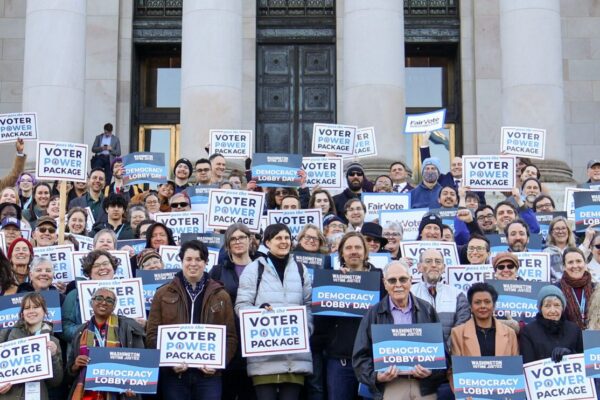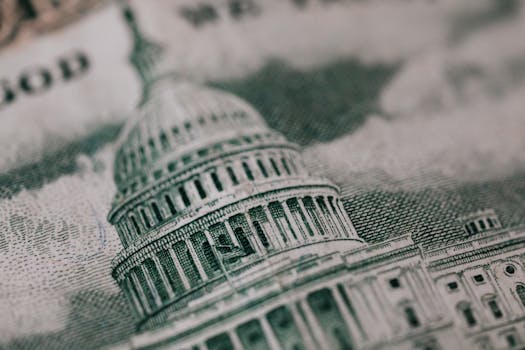Plastic pollution isn’t just wasteful and unsightly, we carry its effects in our bodies.
Washington state has an inconsistent, outdated, and inefficient recycling system that has not been able to keep up with the avalanche of plastic and paper packaging our economy churns out.
The Recycling Reform Act, a 2025 focus for the Environmental Priorities Coalition (EPC), will modernize the state’s recycling system. It will make producers — the companies that actually make packaging decisions — financially responsible for the end-of-life costs of these materials. Today, Washington residents and the environment bear those costs.
Not recycling hurts our pocketbooks; it also hurts ecosystems and people.
When plastics aren’t recycled, they end up in landfills, or tossed to the roadside or a riverbank or a beach or a footpath. There, those plastics break down, eroding and crumbling into ever smaller pieces until they turn into a fine sand of microplastics, defined as plastic bits less than 5 millimeters in diameter, half the smallest measure on a ruler. Over time, these tiny bits get smaller and smaller, becoming “nanoplastics” just a millionth of a meter in diameter.
Already, an incomprehensible number of these tiny plastic particles have entered the biosphere. A 2021 tally put the number of microplastics in the upper oceans at 24 trillion. If you could put all those bits back together again, there would be enough material to create 30 billion half-liter water bottles—another mind-boggling number.
Over the last 50 years, microplastics and nanoplastics have found their way into every nook and cranny and crevice of the planet: from the Mariana Trench, the ocean’s deepest spot, to the top of Mt. Everest. Microplastics and nanoplastics have been found in soil, in air, in snow, in rain, in fish and shellfish, and more. All told, more than 1,500 species have been shown to ingest microplastics.
That includes you.
Microplastics have been detected in tap water, bottled water, beer, fresh fruit and vegetables and even salt. One study estimates that the average adult ingests 2,000 bits of microplastic each year, just from the salt in their diet. Another study shows that seafood lovers could consume up to 11,000 bits of microplastic annually just from eating mussels occasionally.
So it should come as no surprise that plastic particles have been confirmed in a least 15 different components of the human body including breast milk, the spleen, the liver and the colon. Recent studies have found plastics in human blood, and even in the tiniest parts of human lungs. Nanoplastics have been shown to enter human cells, and even to cross the usually firm barrier between the bloodstream and the brain.
So, you might be asking, has anyone proved that this damages human health?
It’s complicated. To answer that question, you can’t just feed people a microplastic diet and wait for them to get sick. But studies of animals should give us pause.
For instance, studies in fish show that exposure to microplastics can result in an allergic response that damages their metabolism. Studies in fish and other animals show that microplastics result in reproductive and developmental problems, can be toxic to the nervous system and cause organ damage. And lab studies using simulations of human organs found that microplastics can damage DNA, the foundation of our genetics, and of our biology.
As we wait for science to catch up with this problem, however, it just would seem to be common sense that we don’t want microplastics in our blood and in our lungs. Likewise, we don’t want microplastics in the bodies of other living beings. Nor do we want them in our soil, our water, our air, our oceans. Once there, they are impossible to remove.
Obviously, global microplastic pollution is a huge problem that demands many actions. But one relatively straightforward thing we can do is to encourage manufacturers to use less plastic packaging and to make it easier for everyone to recycle, thus keeping plastic out of the biosphere in the first place. That is what the Recycling Reform Act is designed to do.
Only 17% of our state’s plastic packaging waste is actually recycled. Recycling access varies across the state and many Washington residents must pay extra for recycling services. Residents in 11 counties have no access to curbside recycling services at all.
The Recycling Reform Act will create incentives for companies to reduce packaging and instead use packaging that is reusable, compostable, or recyclable. It will standardize rules for what can be recycled. It will provide free universal recycling services to all Washingtonians. It will establish a bottle deposit and return system.
Globally, companies have been complying with producer responsibility programs since the 1990s, with great results. In the last two years, California, Colorado, Maine, and Oregon have passed producer responsibility programs for packaging and more states are considering putting their own programs in place.
We can’t put the microplastic genie back in the bottle, but we can stop it from getting bigger. The Recycling Reform Act will help make that happen.
Your donation ensures a sustainable future.


